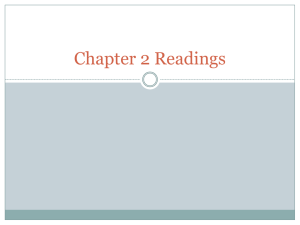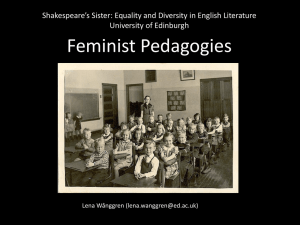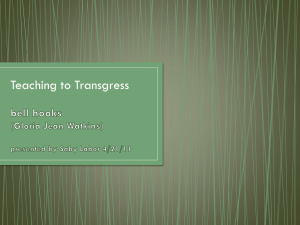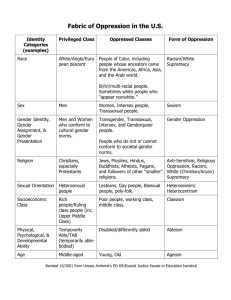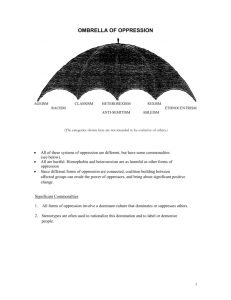Week 1
advertisement
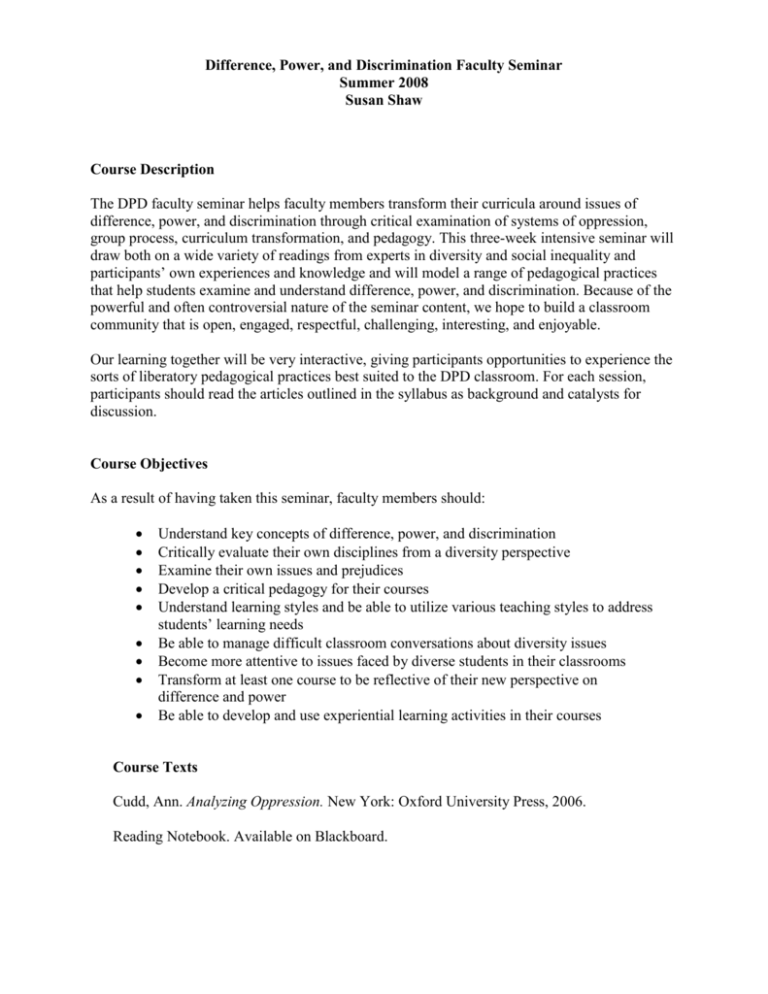
Difference, Power, and Discrimination Faculty Seminar Summer 2008 Susan Shaw Course Description The DPD faculty seminar helps faculty members transform their curricula around issues of difference, power, and discrimination through critical examination of systems of oppression, group process, curriculum transformation, and pedagogy. This three-week intensive seminar will draw both on a wide variety of readings from experts in diversity and social inequality and participants’ own experiences and knowledge and will model a range of pedagogical practices that help students examine and understand difference, power, and discrimination. Because of the powerful and often controversial nature of the seminar content, we hope to build a classroom community that is open, engaged, respectful, challenging, interesting, and enjoyable. Our learning together will be very interactive, giving participants opportunities to experience the sorts of liberatory pedagogical practices best suited to the DPD classroom. For each session, participants should read the articles outlined in the syllabus as background and catalysts for discussion. Course Objectives As a result of having taken this seminar, faculty members should: Understand key concepts of difference, power, and discrimination Critically evaluate their own disciplines from a diversity perspective Examine their own issues and prejudices Develop a critical pedagogy for their courses Understand learning styles and be able to utilize various teaching styles to address students’ learning needs Be able to manage difficult classroom conversations about diversity issues Become more attentive to issues faced by diverse students in their classrooms Transform at least one course to be reflective of their new perspective on difference and power Be able to develop and use experiential learning activities in their courses Course Texts Cudd, Ann. Analyzing Oppression. New York: Oxford University Press, 2006. Reading Notebook. Available on Blackboard. For our second class, please read all of Ann Cudd’s Analyzing Oppression. For our June 26 class, please write a brief autobiography of your own experiences dealing with issues of gender, race/ethnicity, social class, sexual identity, ability, age, and religion, as a member of both the dominant and subordinate groups within each category of difference. Course Schedule and Readings Week 1 June 23 Introduction to DPD Choose 1: Mayhew, Matthew J. and Heidi E. Grunwald. 2006. “Factors Contributing to Faculty Incorporation of Diversity-Related Course Content.” The Journal of Higher Education 77. Schmitz, Betty. 1991. “Diversity & Collegiality in the Academy.” Liberal Education 77. Gurin, Patricia, Biren A. Nagda, and Gretchen E. Lopez. 2004. “The Benefits of Diversity in Education for Democratic Citizenship.” Journal of Social Issues 60. Ropers-Huilman, Becky. “Social Justice in the Classroom.” College Teaching 43. June 24 Analyzing Oppressions Cudd, Ann. Analyzing Oppression. Recommended Readings (online) Ore, Tracy. 2000. “Constructing Differences.” Frye, Marilyn. 1983. “Oppression.” The Politics of Reality. Crossing Press. Pharr, Suzanne. 1988. “The Common Elements of Oppressions.” Homophobia: A Weapon of Sexism. Little Rock: The Women’s Project. Hill Collins, Patricia. 2000. “Toward a New Vision.” The Social Construction of Difference and Inequality. Ed. Tracy Ore. McIntosh, Peggy. 1998. “White Privilege and Male Privilege.” Race, Class, and Gender: An Anthology. Ed. Margaret Andersen and Patricia Hill Collins. Wadsworth. Lorde, Audre. 1984. “Age, Race, Class, and Sex.” Sister Outsider. Crossing Press. June 25 Religion in a Liberal Democracy Kuh, George and Robert M. Gonyea, “Spirituality, Liberal Learning, and College Student Engagement,” Liberal Education, Winter 2006. Stern, Marc D. “Is Religion Compatible with Liberal Democracy,” http://www.trincoll.edu/depts/csrpl/Religion%20and%20Liberal%20Democracy /relibdem.htm Tisdell, Elizabeth J. 2007. “In the New Millennium: The Role of Spirituality and the Cultural Imagination in Dealing with Diversity and Equity in the Higher Education Classroom.” Teachers College Record. 109. June 26 Understanding & Resisting the Oppressions: Race & Racism Rebollo-Gil, Guillermo and Amanda Moras. “Defining an ‘anti’ stance: key pedagogical questions about engaging anti-racism in college classrooms.” Race Ethnicity and Education 9 ( December 2006): 381– 394. Yamato, Gloria. “Something about the Subject Makes It Hard to Name.” Race, Class, & Gender: An Anthology. Ed. Margaret Andersen and Patricia Hill Collins. Wadsworth, 1998. Kernahan, Cyndi and Tricia Davis. 2007. “Changing Perspective: How Learning about Racism Influences Student Awareness and Emotion.” Teaching of Psychology 34. Kandaswami, Priya. 2007. “Beyond Colorblindness and Multiculturalism: Rethinking Anti-Racist Pedagogy in the University Classroom.” Radical Teacher 80. June 27 Sex, Gender, & Sexism Copp, Martha and Sherryl Kleinman. Practicing What We Teach: Feminist Strategies for Teaching about Sexism. Feminist Teacher 18 (2008): 101124. Kimmel, Michael. “Inequality and Difference.” Oppression, Privilege, & Difference. Ed. Helke and O’Connor. Recommended: Angelou, Maya. “Phenomenal Woman.” Women’s Voices, Feminist Visions. Ed. Susan M. Shaw and Janet Lee. New York: McGraw-Hill, 2004. Allen, Paula Gunn. “Angry Women are Building.” Race, Class & Gender. Ed. Andersen and Hill Collins. Week 2 June 30 Class and Classism Langston, Donna. “Tired of Playing Monopoly?” Race, Class & Gender. Ed. Andersen and Hill Collins. Gorski, Paul C. “The Question of Class.” 2007. Education Digest 73. Godinez Ballon, Estela, et al. 2006. “Are You Oppressed if You Don’t Think You Are? Defining and Defending Prosperity among Working-Class Students in a Public University.” Women’s Studies 35. Yeskel, Felice. 2007. “Opening Pandora’s Box: Adding Classism to the Agenda.” The Diversity Factor 15. Recommended: Jordan, June. “Report from the Bahamas.” Oppression, Privilege, & Difference. Ed. Lisa Heldke and Peg O’Connor. Boston: McGraw-Hill, 2004. Zweig, Michael. “Why Is Class Important?” The Meaning of Difference. Ed. Rosenblum and Travis. Mantsios, Gregory. “Media Magic.” The Social Construction of Difference. Ed. Tracy Ore. Mountain View, CA: Mayfield, 2000. July 1 Sexual Identity, Homophobia, and Heterosexism Flávia do Amaral Madureira, Ana. 2007. “The Psychological Basis of Homophobia: Cultural Construction of a Barrier.” Integrative Psychological and Behavioral Science 41. McCarthy, Linda. “What about the ‘T’?” Multicultural Perspectives 5 (2003): 4648. Pharr, Suzanne. “Homophobia: A Weapon of Sexism.” Oppression, Privilege, & Difference. Ed. Helke and O’Connor. Katz, Jonathan. “The Invention of Heterosexuality.” The Social Construction of Difference. Ed. Ore. July 2 Antisemitism, Anti-Arabism, and Anti-Muslim Oppression Dinnerstein, Leonard. “The Christian Heritage.” Readings for Diversity and Social Justice. Ed. Maurianne Adams, et al. Routledge, 2000. Wingfield, Marvin. 2006. “Arab Americans: Into the Multicultural Mainstream.” Equity and Excellence in Education 39. Recommended: Sacks, Karen Brodkin.” How Jews Became White.” The Social Construction of Difference. Ed. Tracy Ore. Cainkar, Louise. 2006. “The Social Construction of Difference and the Arab American Experience.” Journal of American Ethnic History. July 3 Ability, Disability, & Ableism, Ageism & Adultism Overall, Christine. 2006. “Old Age, Ageism, Impairment, and Ableism: Exploring the Conceptual and Material Connections.” NWSA Journal 18. Anderson, Robert C. 2006. “Teaching (with) Disability: Pedagogies of Lived Experience. The Review of Education, Pedagogy, and Cultural Studies 28. Keith, Lois. “Tomorrow I’m Going to Rewrite the English Language.” What Happened to You? New Press, 1994. Recommended: Puhl, R. M. and K.D. Brownell. “Psychosocial Origins of Obesity Stigma.” Obesity Reviews 4 (2003): 213-227. Simmons, Michael. “Eh? What? Please Speak Up.” New Statesman. November 2004. July 4 Holiday Break Week 3 July 7 Environmental Justice United Church of Christ. 2007. “Toxic Wastes and Race at 20.” http://www.ucc.org/justice/environmental-justice/pdfs/introduction.pdf Underhill-Sim, Yvonne. 2006. “Environmental Education and Gender Justice.” Convergence 39. Recommended: Couch, Jim F., Peter M. Williams, Jon Halvorson, and Keith Malone. “Of Racism and Rubbish: The Geography of Race and Pollution in Mississippi.” The Independent Review 8.2 (2003): 235-247. Seager, Joni. “Rachel Carson Died of Breast Cancer: The Coming of Age of Feminist Environmentalism.” Signs: Journal of Women in Culture and Society 28.3 (2003): 945-947. July 8 Alliance-Building, Coalition-Building, & Reconciliation Anzaldua, Gloria. “Allies.” Teaching for Diversity and Social Justice. Ed. Maurianne Adams, Lee Anne Bell, and Pat Griffin. New York: Routledge, 1997, 475-477. Hall, Jacquelyn Dowd. “The Long Civil Rights Movement and the Political Uses of the Past.” The Journal of America History Mar. 2005: 1233-1263. Willoughby, Anderson S. 2008. “The Past on Trial: Birmingham, the Bombing, and Restorative Justice.” California Law Review 96. July 9 Curriculum Transformation Seymour, Nicole. 2007. “The Interests of Full Disclosure: Agenda-Setting and the Practical Initiation of the Feminist Classroom.” Feminist Teacher 17. Rich, Adrienne.1979. “Taking Women Students Seriously.” On Lies, Secrets, and Silence. New York: W.W. Blizzard, Deborah and Susan Foster. 2007. “Feminist Pedagogy and Universal Design in a Deaf and Hearing World: Linking Cultures through Artifacts and Understanding.” Feminist Teacher 17. July 10 Syllabus Workshop July 11 Teaching in a Just Classroom & CELEBRATION! Simpson, Jennifer. 2006. “Reaching for Justice: The Pedagogical Politics of Agency, Race, and Change.” The Review of Education, Pedagogy, and Cultural Studies 28. Robinson, Carol F. and Peter J. Kakela. 2006. “Creating a Space to Learn: A Classroom of Fun, Interaction, and Trust.” College Teacher 54.
